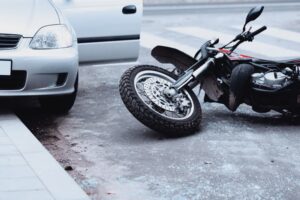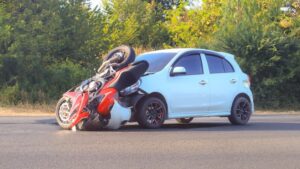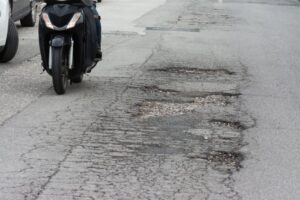Motorcycle accidents can be devastating, often resulting in serious injuries or fatalities. If you’ve been involved in a motorcycle accident that wasn’t your fault, you’re likely searching for answers and trying to make sense of what happened.
Understanding the common causes of these accidents can provide some clarity and help you handle the aftermath more effectively. Contact an experienced Nashua motorcycle accident attorney for legal assistance and to secure the compensation you deserve.
Many different factors contribute to motorcycle accidents. Below are 10 of the most common causes of motorcycle crashes.
1. Car Doors

One of the most unexpected hazards for motorcyclists is the sudden opening of car doors. This scenario, often referred to as dooring, occurs when a driver or passenger opens their car door without checking for oncoming traffic.
The compact size of motorcycles makes them less visible, and the sudden appearance of an obstacle can leave riders with little time to react.
To reduce the risk of dooring accidents, motorcyclists are advised to ride slightly towards the left side of the lane. This gives them more space and time to react if a car door opens unexpectedly.
However, the primary responsibility lies with vehicle occupants to check their surroundings before opening doors.
2. Reckless Driving, Speeding, and Alcohol Use
Reckless driving behaviors, including speeding and driving under the influence of alcohol or drugs, significantly increase the risk of accidents for all road users, but especially for motorcyclists.
Due to their smaller size and lack of protective enclosure, motorcycles are particularly vulnerable when other drivers engage in dangerous behaviors.
Speeding reduces reaction time and increases the severity of crashes. Alcohol and drug use impair judgment, coordination, and reaction time, making it extremely dangerous to operate any vehicle.
3. Lane Splitting
Lane splitting, the practice of riding a motorcycle between lanes of slow-moving or stopped traffic, is a controversial topic. While it can help motorcyclists navigate through congested areas more quickly, it also poses significant risks.
Other drivers may not anticipate a motorcycle passing between lanes and may change lanes without warning, leading to collisions.
The legality and safety of lane splitting vary by jurisdiction. In areas where it’s permitted, both motorcyclists and other drivers need to be extra vigilant to prevent accidents.
4. Head-On Collisions

Head-on collisions are among the most dangerous types of motorcycle accidents.
These often occur when a vehicle crosses the center line into oncoming traffic or when a motorcyclist is forced to swerve into oncoming lanes to avoid another hazard. The force of impact in these collisions can be catastrophic due to the combined speed of both vehicles.
5. Rear-End Collisions
While rear-end collisions might seem less severe for cars, they can be extremely dangerous for motorcyclists.
The lack of substantial protective barriers on a motorcycle means that even a low-speed impact from behind can throw the rider off balance or entirely off the bike.
6. Sudden Stops
Sudden stops by vehicles ahead pose a significant risk to motorcyclists. The smaller size of motorcycles means they require less stopping distance than cars, but this can lead to dangerous situations if a vehicle in front stops abruptly without warning.
It’s important for other drivers to be aware of motorcycles and avoid making unexpected stops when possible.
7. Left-Turn Accidents
Left-turn accidents are common and particularly dangerous for motorcyclists. They often occur when a car making a left turn fails to see an oncoming motorcycle or misjudges its speed and distance. The resulting collision can be severe, as the motorcycle often strikes the side of the turning vehicle at full speed.
Drivers are responsible to double-check for motorcycles before making left turns, especially given their smaller profile.
8. Corner-Turning Accidents
Cornering accidents often occur when a driver enters a turn too fast or encounters unexpected road conditions mid-turn.
To prevent corner-turning accidents that result in motorcycle accidents, drivers must adjust their speed before entering the turn, and be prepared for changing road conditions.
9. Motorcycle Defects
Sometimes, accidents are caused not by rider error or other drivers, but by defects in the motorcycle itself. Issues with critical components can lead to loss of control and accidents.
If a defect is suspected to be the cause of an accident, preserve the evidence and consult with experts who can determine if a manufacturing or design flaw contributed to the crash.
10. Road Conditions

Poor road conditions pose significant risks to all vehicles, but they can be particularly hazardous for motorcyclists. Potholes, uneven road surfaces, wet or icy roads, and debris are challenges that all drivers must navigate. However, these hazards present an even greater danger to motorcycles, which have only two points of contact with the road, making them more susceptible to losing traction or stability.
All drivers are responsible for adjusting to road conditions. Car and truck drivers have a duty to exercise extra caution when road conditions are less than ideal.
Talk to a Motorcycle Accident Lawyer Today
If you’ve been involved in a motorcycle accident that wasn’t your fault, you need to understand your rights and options. That’s where Coates Law Office can help.
We’re committed to helping you with the legal process, safeguarding your rights, and fighting for the compensation you deserve.
Don’t let someone else’s negligence get in your way. Contact a personal injury lawyer at Coates Law Office today for a free consultation. Your motorcycle accident lawyer will review your case, explain your options, and help you take the next steps toward recovery and justice.
